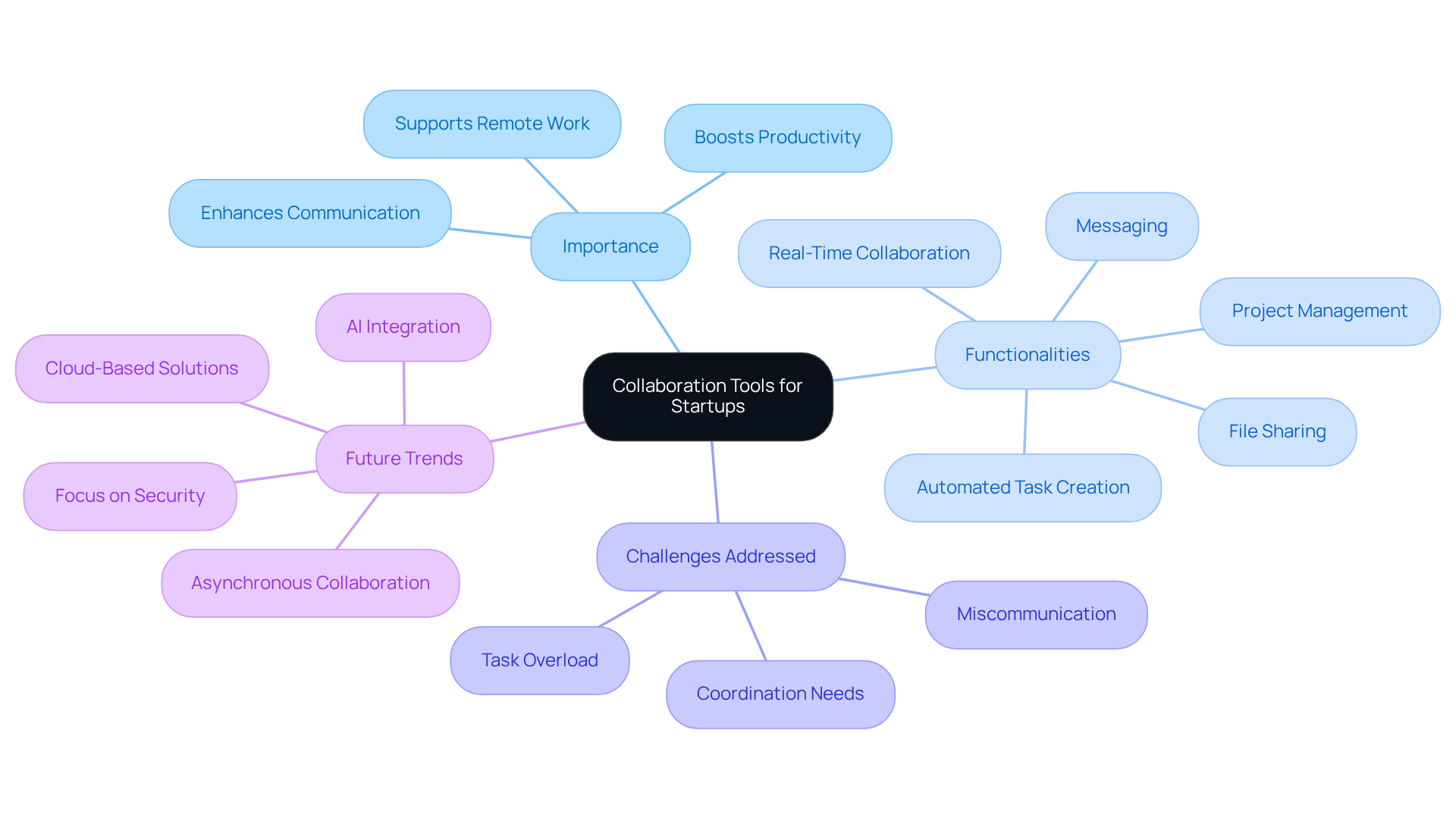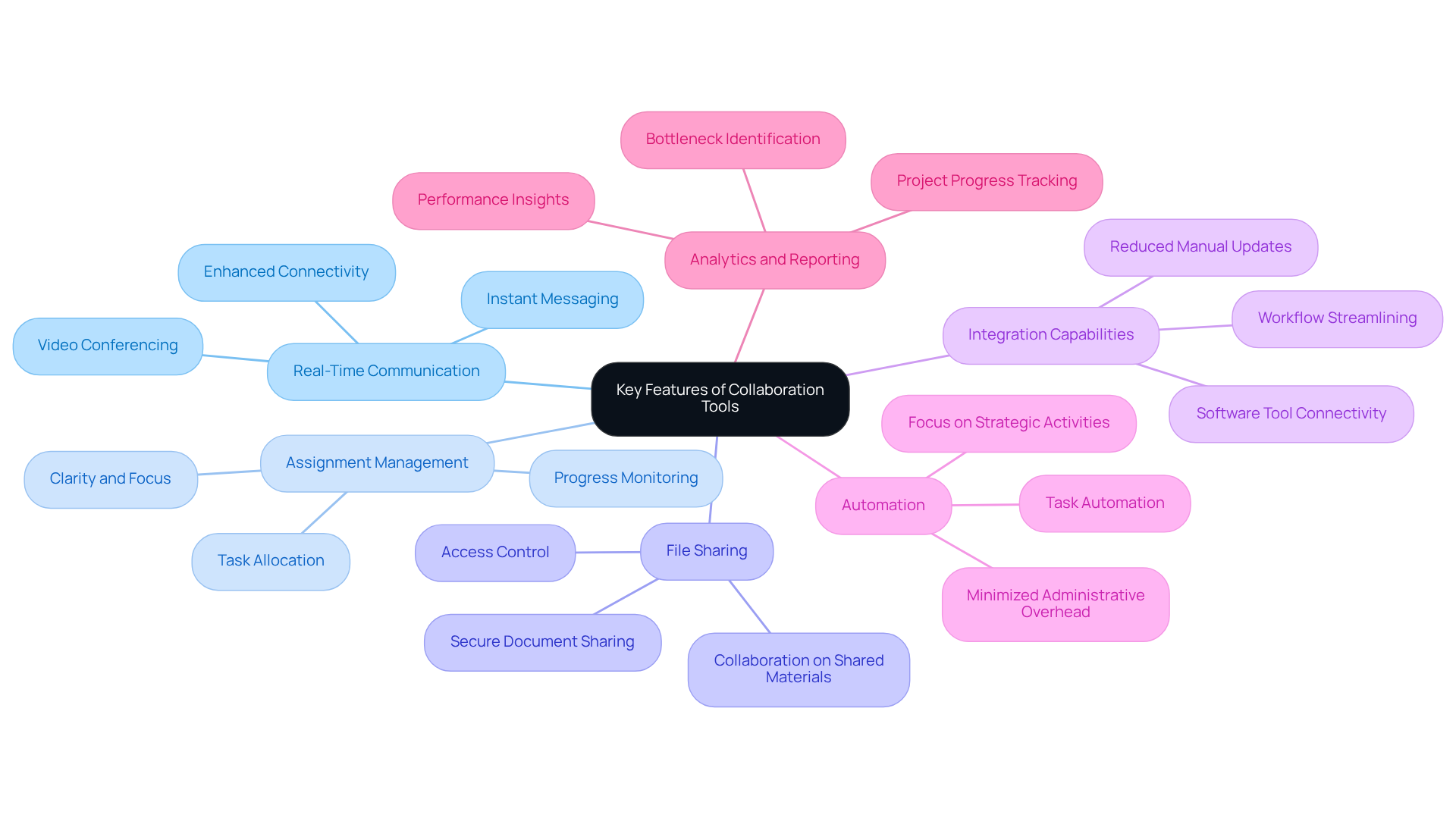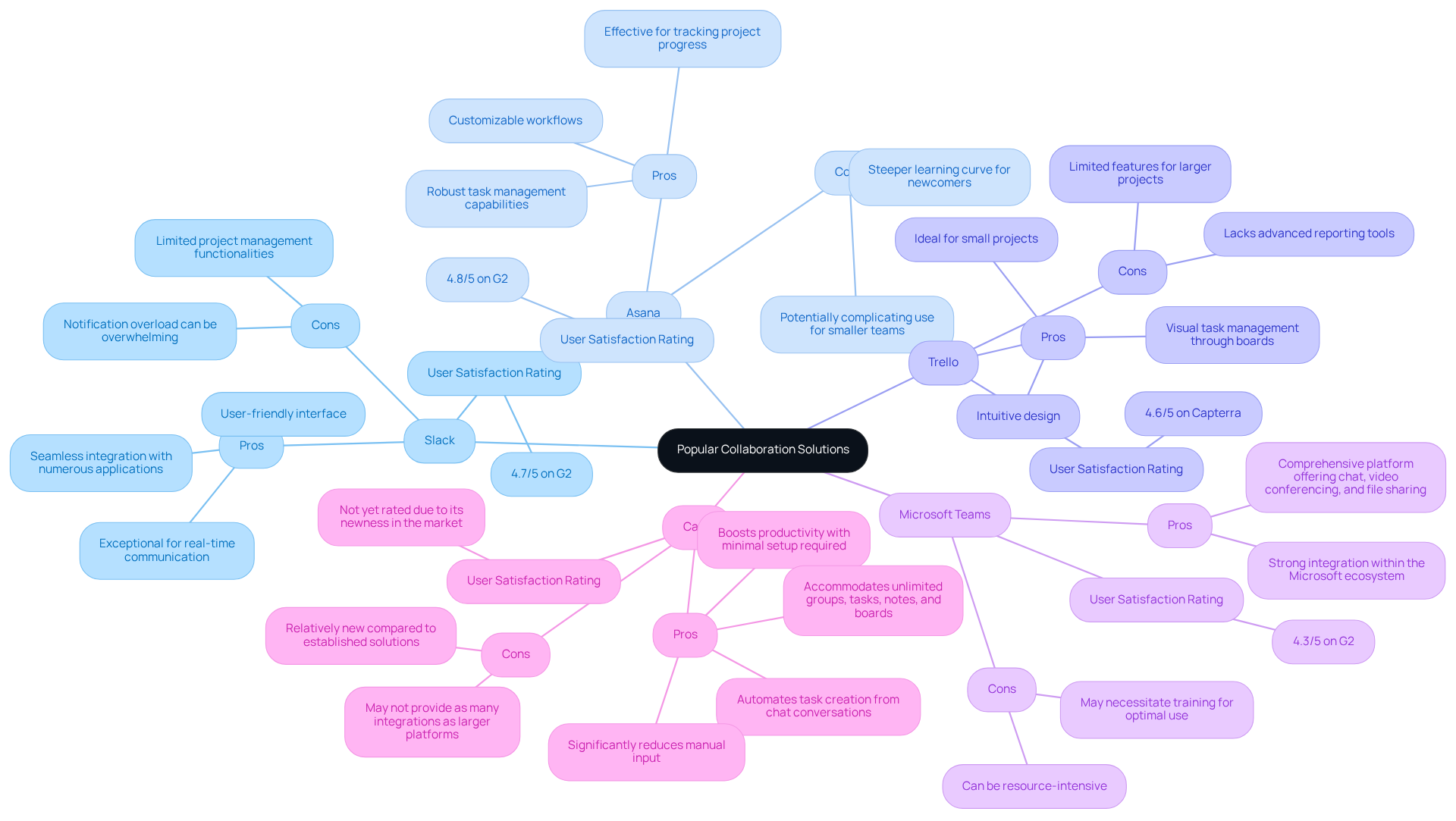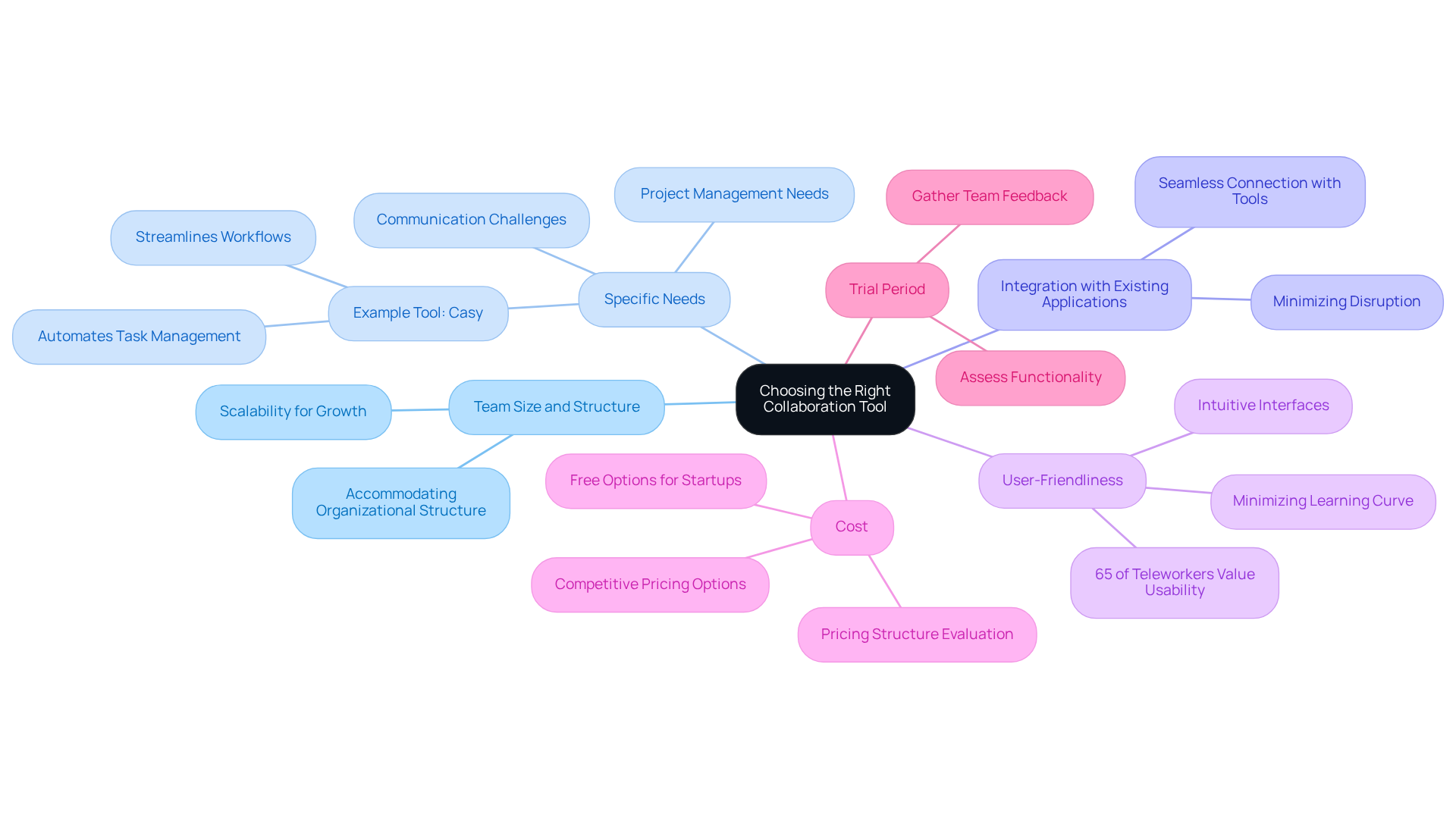Overview
Essential business collaboration tools for startups encompass:
- Real-time communication platforms
- Task management systems
- Secure file sharing solutions
- Automation features that streamline workflows and enhance productivity
These tools are not merely beneficial; they are crucial for overcoming common startup challenges, such as miscommunication and task overload. By integrating functionalities that allow teams to focus on their core activities, these tools maintain operational efficiency and drive success.
Are you ready to elevate your startup's performance? Embrace these essential tools and watch your productivity soar.
Introduction
In the dynamic world of startups, where every second counts and collaboration is crucial, the right tools can significantly impact a business's success. As new enterprises work to enhance efficiency and streamline communication, the demand for effective collaboration solutions has surged. This article explores essential business collaboration tools that empower startups to navigate challenges and optimize workflows.
With a plethora of options available, how can entrepreneurs identify which tools will genuinely elevate their operations and cultivate a culture of teamwork?
Understanding Collaboration Tools for Startups
Cooperation resources are vital for new businesses, facilitating efficient communication, project oversight, and optimized workflows. In the fast-paced startup environment, where agility and efficiency are paramount, these resources are instrumental in overcoming challenges such as miscommunication, task overload, and the ever-present need for coordination. Startups are increasingly adopting business collaboration tools, underscoring a growing reliance on these resources to boost productivity.
By integrating functionalities like messaging, file sharing, and project management, business collaboration tools empower teams to focus on their core activities while significantly minimizing operational overhead. Moreover, security and compliance features are essential for new businesses handling sensitive data, ensuring that their operations remain secure. Consider Casy, for instance; it automates task creation and updates without manual input, setting it apart from other applications.
As new enterprises increasingly embrace cloud-based solutions, understanding the landscape of available business collaboration tools becomes crucial for enhancing productivity and fostering effective collaboration. In 2025, emerging companies must prioritize digital preparedness, ensuring they possess the right resources to thrive in a technology-driven environment. This focus will ultimately lead to improved customer satisfaction and operational effectiveness.

Key Features of Leading Collaboration Tools
Leading business collaboration tools for startups encompass a range of essential features designed to enhance productivity and streamline workflows.
-
Real-Time Communication: Instant messaging and video conferencing capabilities are crucial for facilitating quick discussions. They enable teams to stay connected, regardless of their physical locations. This is particularly important as 70% of technology entrepreneurs report that remote work has maintained or enhanced productivity levels.
-
Assignment Management: Efficient resources for developing, allocating, and monitoring activities guarantee responsibility and advancement within groups. Startups benefit from features that allow for the organization of tasks into categories, enhancing clarity and focus.
-
File Sharing: Secure platforms for sharing documents and resources are vital for collaboration. They allow team members to access and contribute to shared materials seamlessly. Enhanced security features are increasingly prioritized to protect sensitive information, especially as 58% of enterprises identify risk assessment as a key function for managing communications.
-
Integration Capabilities: The ability to connect with other software tools, such as CRM and project management systems, streamlines workflows and reduces the need for manual updates. This integration is essential for maintaining efficiency in fast-paced environments.
-
Automation: Features that automate repetitive tasks significantly reduce manual input, freeing up time for strategic activities. Casy exemplifies this by minimizing administrative overhead and miscommunication, enabling new businesses to concentrate on essential operations.
-
Analytics and Reporting: Tools that provide insights into team performance and project progress help teams make informed decisions. Startups can leverage these analytics to identify bottlenecks and optimize their workflows effectively.
By integrating these features, business collaboration tools empower new businesses to enhance communication, improve project management, and ultimately boost productivity in their operations. With the collaboration software market projected to reach $19.86 billion by 2032, the relevance of these tools in the startup ecosystem is undeniable.

Pros and Cons of Popular Collaboration Solutions
-
Slack
Pros: Exceptional for real-time communication, seamlessly integrates with numerous applications, and features a user-friendly interface.
Cons: Notification overload can be overwhelming, and it offers limited project management functionalities.
User Satisfaction Rating: 4.7/5 on G2. -
Asana
Pros: Robust task management capabilities, customizable workflows, and effective for tracking project progress.
Cons: Steeper learning curve for newcomers, potentially complicating use for smaller teams.
User Satisfaction Rating: 4.8/5 on G2. -
Trello
Pros: Visual task management through boards, intuitive design, and ideal for small projects.
Cons: Limited features for larger projects and lacks advanced reporting tools.
User Satisfaction Rating: 4.6/5 on Capterra. -
Microsoft Teams
Pros: Comprehensive platform offering chat, video conferencing, and file sharing, with strong integration within the Microsoft ecosystem.
Cons: Can be resource-intensive and may necessitate training for optimal use.
User Satisfaction Rating: 4.3/5 on G2. -
Casy
Pros: Automates task creation from chat conversations, significantly reduces manual input, and boosts productivity with minimal setup required. It accommodates unlimited groups, tasks, notes, and boards, enhancing its appeal for diverse workflows.
Cons: May not provide as many integrations as larger platforms and is relatively new compared to established solutions.
User Satisfaction Rating: Not yet rated due to its newness in the market.

Choosing the Right Collaboration Tool for Your Startup
When selecting a collaboration tool for your startup, consider the following criteria:
- Team Size and Structure: Choose a tool that can scale with your team’s growth and accommodate your organizational structure. This ensures it remains effective as you expand.
- Specific Needs: Identify the main challenges your group encounters—whether it's communication, project management, or assignment tracking—and consider using business collaboration tools to address them. Select a business collaboration tool that effectively addresses those needs. For instance, Casy is designed to automate task management and streamline workflows, making it a suitable choice for startups.
- Integration with Existing Applications: Ensure that the business collaboration tools can seamlessly connect with other software your group already utilizes, such as Slack or Google Workspace. This minimizes disruption and enhances workflow efficiency.
- Business Collaboration Tools: Choose business collaboration tools that are intuitive and simple to use. This will aid in minimizing the learning curve for group members and encourage faster adoption. Studies show that 65% of teleworkers view user-friendly interfaces as crucial for effective collaboration.
- Cost: Evaluate the pricing structure of business collaboration tools to ensure that it aligns with your budget while still providing the necessary features to support your operations. Numerous collaborative platforms offer competitive pricing structures, including free options, which can be advantageous for new businesses.
- Trial Period: Take advantage of free trials to assess the functionality and gather feedback from your team before making a long-term commitment. This approach allows startups to evaluate the tool's fit without financial strain.

Conclusion
The significance of business collaboration tools for startups is paramount; they are essential in enhancing communication, streamlining workflows, and ultimately driving productivity. By understanding and leveraging these tools, new businesses can effectively navigate the complexities of their environments, ensuring agility and efficiency in their operations.
Key features such as real-time communication, assignment management, file sharing, and integration capabilities are crucial for fostering collaboration. Analyzing popular tools like Slack, Asana, Trello, Microsoft Teams, and Casy provides valuable insights into their advantages and limitations, enabling startups to make informed decisions tailored to their unique needs. The focus on automation and analytics further emphasizes the necessity of selecting tools that not only facilitate communication but also enhance overall performance.
In the fast-paced landscape of startups, choosing the right collaboration tool is a strategic imperative. By considering factors such as team size, specific operational challenges, and budget constraints, startups can identify solutions that align with their objectives. Embracing these collaboration tools will not only improve internal processes but also enhance customer satisfaction and drive long-term success. As the market for collaboration software continues to expand, startups must prioritize these tools to thrive in an increasingly competitive environment.
Frequently Asked Questions
Why are collaboration tools important for startups?
Collaboration tools are vital for startups as they facilitate efficient communication, project oversight, and optimized workflows, helping to overcome challenges such as miscommunication, task overload, and the need for coordination.
What functionalities do business collaboration tools typically include?
Business collaboration tools typically integrate functionalities like messaging, file sharing, and project management, which empower teams to focus on their core activities while minimizing operational overhead.
How do collaboration tools enhance security for startups?
Collaboration tools often include security and compliance features that are essential for startups handling sensitive data, ensuring their operations remain secure.
Can you provide an example of a unique collaboration tool?
Casy is an example of a collaboration tool that automates task creation and updates without manual input, distinguishing it from other applications.
What trend is emerging among new enterprises regarding collaboration tools?
New enterprises are increasingly embracing cloud-based solutions, making it crucial to understand the landscape of available business collaboration tools to enhance productivity and foster effective collaboration.
What should startups prioritize in 2025 to thrive in a technology-driven environment?
Startups should prioritize digital preparedness by ensuring they possess the right resources, including collaboration tools, to improve customer satisfaction and operational effectiveness.




